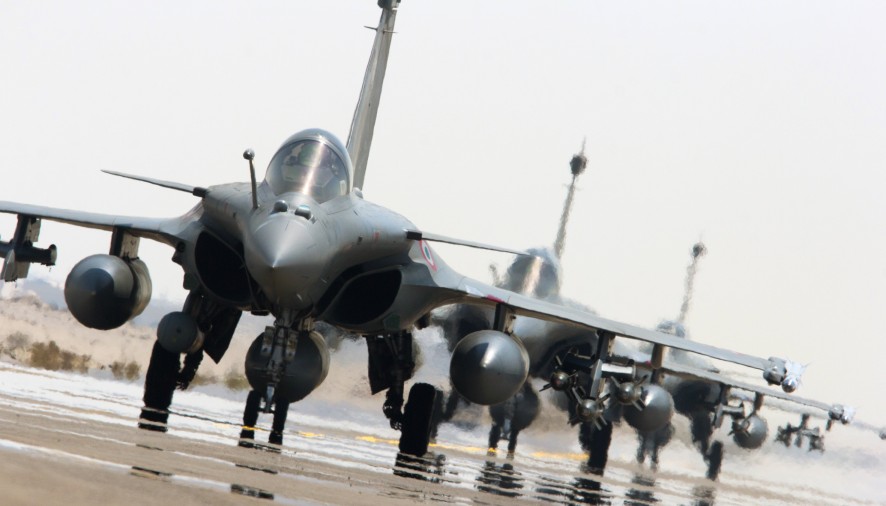What happened?
The UK has extended airstrikes to Syria after the House of Commons passed a government motion authorising action against Islamic State in Syria by 397 to 223. It was a comfortable win for Cameron, with 66 Labour MPs supporting the motion and helping the government to a majority of 174. As a result of the vote, the RAF have already completed six successful air strikes on on an IS-controlled oil field at the time of writing, according to the Ministry of Defence. The government has said there is a clear need to confront the danger of IS by extending action to Syria, however, opponents have strongly criticised the move, arguing it is a repeat of the mistakes made in previous military interventions in Iraq, Afghanistan, and Libya.
The Arguments
Cameron opened the debate to make the case in favour of airstrikes. In particular he stressed that precision airstrikes would limit civilian casualties, and that there have been no civilian casualties from British bombing in Iraq. The PM also repeated his suggestion that there are up to 70,000 moderate ground troops with whom Britain could work to defeat IS. Cameron further pushed the point that IS were already a threat to national security, arguing we cannot “sit back and wait for them to attack us” while the organisation was plots terror attacks against Britain.
The opponents of the motion, led by Corbyn, were sceptical of Cameron’s plans. Criticism focused especially on Cameron’s 70,000 “moderate” fighters; speakers doubted the figure Cameron had arrived at, pointing out that much of the Free Syrian Army and other groups Cameron had cited were fractious and divided, and that many were engaged on their own fronts away from IS and could not be of use.
Furthermore, Corbyn and several others stressed that airstrikes would inevitably lead to civilian casualties. Not only this, but airstrikes would be ineffective against IS as planes were already struggling to find targets in IS territory. Corbyn summed up his stance against the government as “hard-headed common sense”, not pacifism, arguing that the government had failed to make the case for airstrikes. Many other opposition speeches ran in this vein.
While much of the debate focused on dry strategy, there were a few more emotive appeals. “Father of the House” Sir Gerald Kaufman announced he was opposed to airstrikes, stating “I am not going to be party to the killing of innocent civilians for what will simply be a gesture”, while a number of other speakers warned the spectre of Iraq in 2003 hung heavy over the government’s proposals.
From the other side, by far the greatest surprise of the night was Hilary Benn. In an impassioned speech Benn appealed to a moral duty to show solidarity with the French and stand up to human rights abuses. Drawing on Labour’s tradition of “internationalism”, Benn pointed to the role Labour took in fighting Franco, Mussolini and Hitler. In his closing remarks Benn said “[Labour] has always stood up against the denial of human rights and for justice and my view, Mr Speaker, is that we must now confront this evil. It is now time for us to do our bit in Syria”. Commentators have widely praised Benn’s speech as the best of the night and one of the best in the recent history of the chamber.
What next?
Both main party leaders come away from the debate with something to worry about. Cameron was repeatedly asked by members of the House to apologise over remarks he made in a meeting of the 1922 Committee in which he labelled Corbyn and those intending to vote against the motion “a bunch of terrorist sympathisers”. Although Cameron suggested during the debate that there was “honour” in voting either way, he stopped short of a direct apology. Cameron’s failure to address his remarks has widely been seen as a blunder.
Meanwhile, Corbyn was forced into giving his MPs a free vote on the issue after failing to reach a consensus with his shadow cabinet before the debate. Although a majority of Labour MPs sided with Corbyn in voting against the motion, a sizeable contingent – 66 MPs in all, including almost half the shadow cabinet – supported the government. It was expected that a significant number of Labour MPs would rebel, however the vote could raise new questions over Corbyn’s ability to control the party.
The outcome of the vote has already been criticised by a large portion of the public. A thousands-strong anti-war demonstration took place outside Parliament during the debate, and the result of the vote was widely condemned on social media with an e-petition opposing airstrikes reaching over 182,000 signatures. Public support for the airstrikes had been falling before the vote; a YouGov poll on 17th November showed 59% in favour of airstrikes with 20% against. By 1st December these figures were 48% and 31% respectively. With less than half of the public approving airstrikes, the government’s mandate for the bombings looks shaky. Corbyn has suggested that Cameron was eager to rush the debate through Parliament, as he knew public opinion was turning against him.
It has yet to be seen how much effect RAF bombings will have in Syria, but this vote could well tarnish the government’s reputation.
(Image: PA)
Sam Robinson

